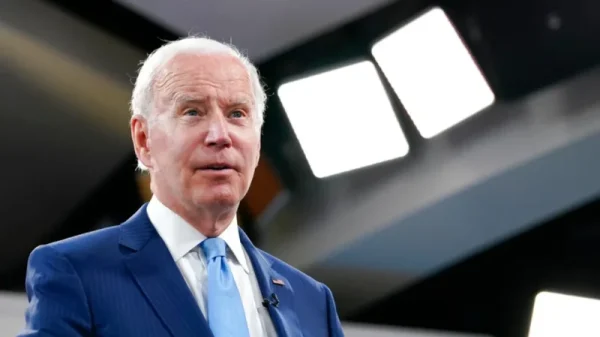An earlier version of this article incorrectly reported that Elon Musk cut off Starlink service to Ukraine’s military as it was attacking the Russian fleet in Crimea last year, based on a new biography of Musk by historian and journalist Walter Isaacson. Isaacson has since said that the account in his book is wrong, and that Musk had never enabled Starlink service within 100 kilometers of the Crimean coast. When the Ukrainians asked that he turn it on to enable their attack, Musk refused, Isaacson now says. This article has been updated to reflect that change.
SpaceX refused to allow Ukraine to use its Starlink satellite internet service last year to guide submarine drones in an attack on the Russian Black Sea Fleet, according to a new biography of SpaceX founder Elon Musk.
The incident underscores how dependent multiple governments have become on a man who controls both a dominant means of high-speed communication and a major platform for public discourse, X. Musk bought X, then known as Twitter, last year, after building SpaceX into a Washington powerhouse.
According to Walter Isaacson, a former Time magazine editor and university professor whose biography of Musk goes on sale Tuesday, the Ukrainian military wanted to use armed submarine drones to attack the Russian fleet. But Isaacson’s book says Musk cut the Starlink service as the attack was underway; the drones “lost connectivity and washed ashore harmlessly,” he wrote.
Late Friday, however, Isaacson posted on X that he had misunderstood what Musk told him about the incident and that the service had never been enabled near Crimea. “To clarify on the Starlink issue: the Ukrainians THOUGHT coverage was enabled all the way to Crimea, but it was not. They asked Musk to enable it for their drone sub attack on the Russian fleet. Musk did not enable it, because he thought, probably correctly, that would cause a major war,” Isaacson wrote on X.
Whatever the case, the recounting of the incident is a reminder of how the SpaceX founder has amassed enormous influence by maintaining a dizzying pace of innovation that has left competitors in the dust — and left governments carefully navigating the relationship.
“One of the advantages is the huge amount of innovation coming out of the private sector, which the government wants to leverage to stay ahead of China and others,” said Brian Weeden, the director of program planning at the Secure World Foundation, a think tank. “The flip side is it gives a lot more power to the private sector and particularly to billionaire individuals who control those companies and technologies.”
At X, Musk’s power and mercurial decisions have caused consternation for some officials and civil society experts as propaganda spreads ahead of a wave of elections across the world next year.
Refusing to go along with Ukraine’s mission “is a great example of the power of communications platforms being concentrated in the hands of a few private companies,” said Bret Schafer, an analyst at the Alliance for Securing Democracy.
Musk stopped warning X users when the content they were viewing was from state-controlled media, and propagandists from Russia and elsewhere took advantage to amplify their content by buying verification check marks.
A study commissioned by the European Union found this week that Russian propaganda was reaching more people on X than before the war in Ukraine. And in the face of criticism about rising hate speech, Musk has sued one nonprofit and threatened to sue another, the Anti-Defamation League.
“It’s really scary to see him using his corporate resources to try to squash critics and skeptics,” said Paul Barrett, deputy director of New York University’s Stern Center for Business and Human Rights.
“You would expect people with this kind of corporate power to operate from self interest or to make mistakes. But you would not expect someone who provides an ally with crucial technology and then snatches it back when they are using it in the middle of a war. Whatever responsible corporate behavior is, that’s not it.”
SpaceX’s Dragon capsule is the only way NASA can send its astronauts to and from the International Space Station. It launches sensitive national security satellites for the Pentagon and the National Reconnaissance Office. It launches more rockets than any other company or country — this year it has already surpassed its record last year of 61 — and operates more satellites than any other entity on Earth, with more than 4,500 in orbit.
SpaceX started providing Starlink internet service to Ukraine after Russia’s invasion, creating a lifeline for the country when its communications systems had largely been knocked out. But according to Isaacson’s book, Musk grew concerned about Ukraine’s military using them for offensive purposes.
“How am I in this war? Musk asked,” according to Isaacson. “Starlink was not meant to be involved in wars. It was so people can watch Netflix and chill and get online for school and do peaceful things, not drone strikes.”
In February, Gwynne Shotwell, SpaceX’s president and chief operating officer, told reporters something very similar.
“We were really pleased to be able to provide Ukraine connectivity and help them in their fight for freedom,” she said. “It was never intended to be weaponized, but the Ukrainians have leveraged it in ways that were unintentional and not part of any agreement.”
Since reports surfaced of SpaceX shutting off satellite communication in Ukraine last year, the Pentagon has granted SpaceX a contract. The details of the contract are unknown — on Thursday Pentagon spokesman Jeff Jurgenson declined to say more “due to the critical nature of these systems.” But Weeden said placing Starlink under contract should allow the Pentagon more control and possibly prevent the service from being shut off again.
“That is the balance that the Defense Department has to grapple with as it focuses on this commercial technology: Is it losing control in some way?” Weeden said. But the government is not helpless and has ways to rein companies in: “You can address a lot of those concerns through contracting mechanism or other legal agreements,” he said.
When SpaceX first launched its Starlink constellation, Musk said the chances of success were not guaranteed. Other satellite companies had tried and failed in the past, given the enormous cost to launch and operate hundreds or thousands of satellites. But in large part because SpaceX is vertically integrated, meaning it not only builds the satellites but launches them itself on its reusable Falcon 9 rocket, it has so far been able to be successful.
In addition to being used in Ukraine, the constellation is used to connect remote communities, and it has been a key part of hurricane recovery efforts as well as in other natural disasters where connectivity is lost.
When SpaceX started Starlink, others were eyeing the market for satellite internet as well. At the time, Musk said, “it’s always good to have competition.” But Starlink has since outpaced its competition.
Another satellite provider, OneWeb, went bankrupt and then was resurrected and operates a far smaller network. Amazon plans to launch thousands of satellites but has yet to send up a single one. It is also facing a lawsuit from one of its shareholders, who alleges the company “acted in bad faith” when awarding launch contracts to other commercial companies, including Jeff Bezos’s Blue Origin, but not to SpaceX.
“Despite being the launch provider with the most proven track record and the lowest prices in the industry, SpaceX was seemingly not considered by Amazon,” the suit alleges. (Bezos owns The Washington Post. Interim CEO Patty Stonesifer sits on Amazon’s board.)
SpaceX is also the sole provider to NASA for crew transportation to the space station. But that’s not because NASA just awarded one contract. It awarded two specifically so that companies would have to compete against each other, driving down the cost and increasing reliability. But the other company to win a contract, Boeing, has yet to fly any astronauts and may not until next year, leaving SpaceX as the only provider.
“SpaceX has been truly innovative in several key areas, launch and large constellation broadband internet — two things people have long dreamed of but have been tried and failed before,” Weeden said. “SpaceX has managed to make them a reality. In many other industries soon after there are breakthroughs, that encourages more competition. And the innovative technology proliferates across multiple companies. But in the case of SpaceX, we haven’t yet seen competitors who have managed to do what they can do.”
That dominant position didn’t come easy. SpaceX was initially locked out of Pentagon launch contracts and had to sue the Air Force to be allowed to compete. It also fought to earn NASA as a customer, and now it is one of the space agency’s most reliable partners.
A good portion of that success stems from Musk himself, who works relentlessly and pushes his teams to as well, attempting to overcome seemingly insurmountable odds. Building rockets that would fly to space and then land safely so that they could be reused is one example, especially as many had told Musk it was impossible. Building a constellation of thousands of satellites was another. Both were accomplished relatively quickly, which is part of the SpaceX ethos.
“You can always go faster than you think you can. Hands down,” Kiko Dontchev, SpaceX’s vice president of launch, said during a recent conference presentation. “There’s always time to gain. There’s always efficiencies to be brought. You think you went fast enough? … You can go faster. Every time my team is like, ‘Dude, we can’t go faster.’ You’re like, ‘Yes, you can.’ Move the goal posts. You’ll be surprised what happens when you challenge people.”
SpaceX has also thrived operating under what are known as fixed-priced contracts, where the contractor must eat any cost overruns. Traditionally, big Pentagon contracts operated under “cost-plus” contracts, allowing companies to be reimbursed if they went over their bid. That, critics have argued, has stifled innovation and allowed companies to move slowly.
The Space Force is also looking to SpaceX and its Starship, which, once flying, will be able to lift enormous amounts of mass to orbit. And it has praised SpaceX for keeping its Starlink constellation online even while Russian jammers were able to interfere with other networks.
“The quality of the link is excellent,” Ukraine’s minister for digital transformation, Mykhailo Fedorov, told The Post last year. “We are using thousands — in the area of thousands — of terminals, with new shipments arriving every other day.”
Missy Ryan contributed to this report. Menn reported from San Francisco.







































